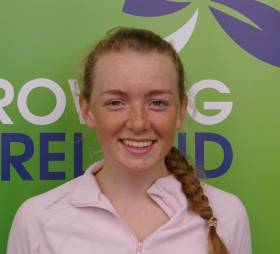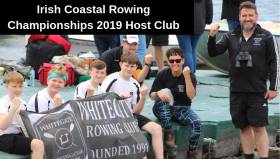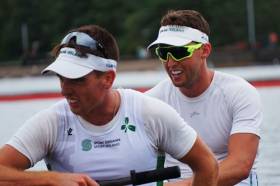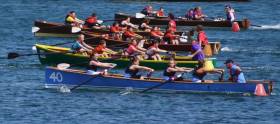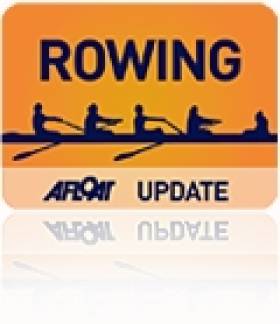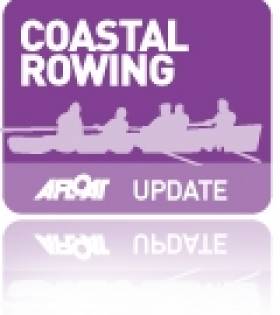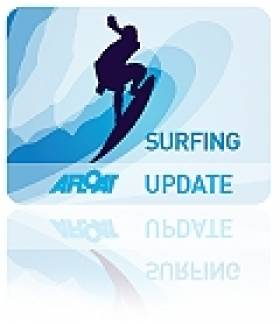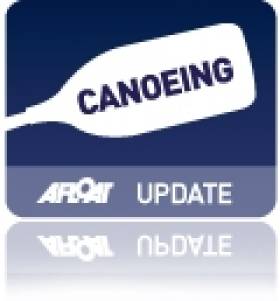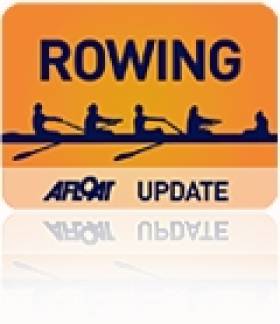Displaying items by tag: Championships
National Yacht Club's Butler and Oram Win Fireball Munster Championships at Killaloe Sailing Club
Fifteen Fireballs competed in the two-day event at the completely remodelled club on the shores of Lough Derg.
The class were greatly honoured to be the first class hosted by KSC since the completion of their brand-new clubhouse. On the Saturday night the class sat down to a terrific meal hosted by club volunteers in its function room, the first meal in the newly built room. The area around the club has been completely remodelled with greatly improved boat and vehicle parking, and room for tents and camper vans.
All in all, the completion of the works is a huge achievement and the Fireball class were delighted to be the first customers.
 Briefing at Killaloe sailing club ahead of the Munster Fireball championships
Briefing at Killaloe sailing club ahead of the Munster Fireball championships
The event itself was a tale of two halves. The forecast for day one was to be breezy, shifty and exceptionally gusty and for once the forecast was 100% accurate. With the conditions just seven boats launched initially to test the waters, in every sense. As the morning wore on that number increased to ten as conditions eased somewhat. Race one was a windward-leeward affair and in fact principal race officer Doireann Kennedy, mentored by Geoff O’Donoghue, wisely stuck to windward-leeward courses for the day, giving sailors the choice of angles downwind, and allowing the race team to quickly re-configure the course for big shifts. And it was those big shifts which provided the greatest challenges during racing, with stinging gusts striking at unexpected angles leading to that water sampling mentioned earlier.
Butler/Oram won races one and three, but didn’t have things their own way by any means. They were frequently beaten to the weather mark and it was their brave/inspired choice of downwind angles where they pulled back places. While most of the fleet tried to follow the gusts downwind Butler/Oram took off in frequently extreme directions, seeking out more pressure and high-wiring down the runs to take places and get back into contention. Race two was won by Ed Óg Butler and Sean Collins who were fast throughout the entire event in all conditions, and were especially sharp upwind.
Frank Miller and Hugo Mickova sailed consistently on day one, posting three third places in the breezy stuff. Josh Porter and Cara McDowell, being lighter, were a bit behind on day one with two fifths in the first races but a second in the final race of the day when conditions had lightened somewhat. Before the meal on Saturday night the class had an open forum meeting to get views on the season ahead and in particular to get views on the racing calendar for 2023. It was especially heartening to see so many young faces at the meeting and get feedback for the next season. Since many Fireballers also sail other classes balancing the racing calendar is never easy. After the meal and some libations, the sailors crawled back to their various tents, vans, hotels and apartments.
 Chara McDowell and Josh Porter with organiser Jim Ryan (rt)
Chara McDowell and Josh Porter with organiser Jim Ryan (rt)
Sunday dawned as expected with little wind but by the time the sailors convened at the club there was a very decent land breeze. However, by the time boats launched that breeze had considerably reduced and then disappeared. Consultations with Geoff O’Donoghue led to the prediction of a thermal wind filling from the opposite direction and so it proved, allowing three “Olympic Triangle” races to be sailed in a fair breeze. Race four was won by Porter/McDowell, leading Butler/Oram and Thomas Chaix/Conor Flynn across the line. Porter/McDowell took the gun again in race five from Butler/Oram and Butler/Flynn.
 Sean Collins and Ed Og Butler
Sean Collins and Ed Og Butler
The final race was a fraught affair with a port/starboard incident leading to Porter/McDowell doing turns, and a very interesting gybe mark situation where Butler/Oram went on what seemed like a gybing dance to attempt to get the inside overlap at the mark in very thin air. We can’t report whether they legally acquired that overlap as it looked distinctly hairy from our viewpoint but they emerged with the inside berth. It was a very noisy affair but Ed Óg did not follow through with a protest. We don’t know if that’s because he is a gentleman or if he conceded that an overlap was established in time. If it was the former his good sportsmanship was rewarded because he and Sean Collins won the final race, with Butler/Oram relegated to fourth through some shifts and light patches approaching the finish.
Butler/Oram were able to discard that race to take the overall with a three-point lead, and Porter/McDowell took second on equal points with Butler/Collins who finished third overall. Miller/Mickova took fourth place overall. Special praise has to go to Jakub Ozarek and Lara Killen from East Down who showed great boat handling ability in all the conditions and went on to win the silver trophy at their first ever Fireball event. And a round of applause for Lara’s dad Paul who drove from East Down and organised the camping and feeding of the youth team. Second Silver were Richard Street/Ollie Lloyd and third were Brenda Nash and Glen Fisher. Another youth team took the classic trophy, carried off by Sam Street and Denis Cully from Blessington SC, with Sam’s father the indefatigable Richard Street as logistics manager and master chef, as well as sailing the event himself.
 Sam Street and Denis Cully won the classic prize
Sam Street and Denis Cully won the classic prize
At the prize-giving ceremony led by main organiser Jim Ryan much thanks and praise went to the club and its volunteers and small gifts were presented to the race officers. It is fair to say that this was an extremely successful event, capping off a remarkable season for the class in Ireland. Despite the effort and time which went into the recent Worlds just a few miles up the lake at LDYC the class is energized and rejuvenated and very much looking forward to the winter DMYC Frostbites series, to the summer 2023 season in Ireland, to the French Nationals in nearby Brittany and to the Europeans in Slovenia next September.
 East Down YC's Jakub Ozarek and Lara Killen won the silver trophy
East Down YC's Jakub Ozarek and Lara Killen won the silver trophy
 2022 Fireball Munster Championships results
2022 Fireball Munster Championships results
#Rowing: Ireland’s lightweight double scull of Aoife Casey and Cliodhna Nolan finished fourth in their heat at the World Under-23 Championships in Florida today and must negotiate a repechage as they target a place in the A Final.
The top two in this heat qualified for the final. Switzerland took first and Germany won a battle with the Netherlands to take second. Casey and Nolan came in ahead of Fiona Chestnutt and Chloe Knight, representing Britain.
The programme was suspended because of thunderstorms. The revised schedule, if it goes ahead, has placed the remaining races for Ireland crews in late afternoon, local time. Florida is five hours ahead of Ireland.
World Rowing Under-23 Championships, Sarasota Bradenton, United States (Irish interest)
Women
Lightweight Double Sculls – Heat One (First two to A Final; rest to Repechage) 1 Switzerland 6:59.78, 2 Germany 7:02.65; 4 Ireland (A Casey, C Nolan) 7:07.28, 5 Britain (1 F Chestnutt) 7:13.48.
#Rowing: Whitegate Rowing Club are delighted to have been selected to host the 2019 Irish Coastal Rowing Championships. This event is one of the largest rowing regattas in Ireland and it is an honour for the club to have been nominated as this year’s host club.
The event will take place on the weekend of August 23rd and 24th and it will be held at the National Rowing Centre, Farran Woods.
The committee of Whitegate Rowing Club cordially invites our local community, club supporters and anyone who simply loves sports to the launch of their hosting of the Irish Coastal Rowing Championships at their cubhouse in Whitegate, Co. Cork on Saturday, April 20th at 6.30 pm.
This launch event coincides with a club open day, where those interested in taking park in the sport are more than welcome to come along and find out what it is all about! The open day runs from 5.30 pm to 7.00 pm and light refreshments will be served
Club Chairperson Rachel Barry said: “Coastal rowing is a fantastic sport and our members range from junior rowers of 10 years, right up to our Masters members (over 55) with incredible experience. We work hard to promote the sport of coastal rowing and are extremely proud of our club’s ethos of inclusion and strong sportsmanship. To be selected to host this year’s Championships is a huge honour and a matter of pride for our local community.”
Whitegate Rowing Club is one of east Cork’s premier coastal rowing venues. The club have been rowing out of their base at the Sawmills in Whitegate since 1991. The club are now looking forward to hosting their third All Ireland Coastal Rowing Championships and have a reputation as a strong and successful club in the sport of coastal rowing.
WRC’s mission is simple: to train and instruct members in the sport of Coastal Rowing. The club strives to foster, promote and develop the sport and create a positive and encouraging environment for all.
#Rowing: Shane O’Driscoll and Mark O’Donovan took fifth in their B Final of the pairs, 11th overall, at the European Championships in Strathclyde Park in Scotland. In overcast but calm conditions, Ireland started well, but Germany took over and held the lead to 1500 metres. By then they were already under real pressure from Ollie Cook and Matt Rossiter from Britain, who took over and won. O’Driscoll won a battle with Ukraine at the back of the field but while they had the fastest final 500 metres they could not get past the Netherlands or Russia, who finished fourth and third. Germany were second.
European Championships, Day Three, Strathclyde, Scotland (Irish interest)
Men
Pair – B Final (Places 7 to 12): Britain 6:36.77; 5 Ireland (M O’Donovan, S O’Driscoll) 6:44.58.
New Coastal Rowing Championships to be Hosted by Rushbrooke
#Rowing: Rushbrooke Rowing Club from Cobh will host the Irish Coastal Rowing Championships next August. It is the first such coastal event to be held under the auspices of Rowing Ireland.
The decision to choose Rushbrooke was made at the inaugural annual delegate meeting of the new Rowing Ireland Coastal Rowing Division in Portlaoise.
Rushbrooke submitted a detailed proposal to hold the championships at the National Rowing Centre in Cork and were given unanimous support. Delegates opted for the weekend of August 18th and 19th for the event.
Ted McSweeney, the chairperson of Rushbrooke Rowing Club said: “This is the greatest honour to be bestowed upon our club. Our club has been in existence since the early 1900s, and although the original club ceased in the late 1960s when the original wooden clubhouse and boats were engulfed by a fire, in 1989, local residents decided to restart the club and agreed on using the Yawl class racing boat. Over the last 28 years, we have gone from strength to strength and have established ourselves as one of the top coastal rowing clubs in Cork.
“As a club, we are delighted at the opportunity to host the inaugural Irish Coastal Rowing Championship and will endeavour to deliver an event that will meet the superb standards that have been set over the past few years. Even at this early stage, we have received immense support, both from the Coastal Rowing community and local organisations. We would like especially to thank the management team at the National Rowing Centre in Farran Woods, who have been exceptionally helpful and forthcoming in assisting us with our bid. A new chapter in coastal rowing has begun and Rushbrooke Rowing Club will strive to maintain the high standard of regattas that we have been accustomed to. We look forward to welcoming all Coastal Rowers to Cork in 2018 and we can assure you of a Ceád Míle Fáilte.’
Kieran Kerr, chairperson of the Rowing Ireland Coastal Division, said: “On behalf of Rowing Ireland, I would like to congratulate Rushbrooke Rowing Club on a very professional bid. We look forward to an exciting inaugural Irish Coastal Rowing Championships.”
Big Weekend for Irish Rowing at Home and in Lucerne
#ROWING: It is a big weekend in Irish rowing, both at home and abroad. The Ireland team travel to Switzerland today to compete in the third and final World Cup Regatta of 2015. The races will be held on Lucerne's Rotsee regatta course from 10th-12th July, the same three days that the annual Irish Rowing Championships take place at home at the National Rowing Centre, Cork.
Sanita Puspure could win a medal at Lucerne, racing in the women’s single sculls, and the rising lightweight men’s double of Paul and Gary O’Donovan are contenders for at least an A Final place. Former world champion Sinéad Jennings teams up with Claire Lambe in the lightweight women’s double. All are Olympic-class crews.
This year’s Irish Rowing Championships features the largest entry ever recorded, with 893 crews entered for the Regatta. Races will run from 9am-5pm on Friday, 8:30am-6:30pm on Saturday and 8:30am-5pm on Sunday. The Championships is the premier domestic event of the rowing season and is expected to attract over 10,000 spectators across the three day duration of the competition. Over 3,000 competitors are making the journey to the NRC with the hopes of returning home with a title.
The senior eights event is one of the most anticipated of the weekend, as Trinity, who reached the second round at Henley Royal Regatta, face defending champions NUIG/Gráinne Mhaol and a UCD/Old Collegians composite. John Keohane is current holder of the men’s single sculls title, and a win this year will be three in a row for the Lee Valley rower.
Killorglin Rowing Club Excel at Irish Coastal Rowing Championships
#COASTAL ROWING: Killorglin won the final event of the day, the men’s four, at an Irish Coastal Rowing Championships which were blessed by good conditions at Lough Currane, Waterville, County Kerry. The blue riband event had gone to Cork clubs for the last four years, but Killorglin’s crew of Cathal Clifford, Cian Clifford, Seán Deignan and stroke Fionnán Crowley brought it back to the host county. Killorglin’s women’s four – stroked by Aileen Crowley – also won.
The award for Sporting Club of the Day went to Carnlough of Antrim, while Ring from Cork had taken the title of best overall junior club, and Cairndhu the best adult club.
Irish Coastal Rowing Championships, Waterville, Kerry (Selected Results, Finals Winners)
Men
Senior: Killorglin. Intermediate: Caherciveen. Junior: Ring. Under-21: Whitegate. Under-18: Passage West. Under-16: Killorglin.
Veterans: Portmagee. Pre-Vet: Fossa.
Women
Senior: Killorglin. Intermediate: Passage West. Junior: Galley Flash.
Under-21: Killorglin. Under-18: Sneem. Under-16: Kilmacsimon.
Veterans: Myross. Pre-Vet: Arklow.
Mixed
Senior: Killorglin. Veterans: Portmagee. Pre-Vet: Portmagee.
Irish Surfers Celebrate Big Title Wins At Home And Abroad
#Surfing - Irish junior champion surfer Iarom Madden has clinched the men's title at the British University Championships, as the Donegal Democrat reports.
Bundoran native Madden - who studies at University College London - used his skills honed on some of the world's finest waves to fend off competition from some of the UK's top young guns to take first place in what was his first appearance at the contest in Newquay, Cornwall last weekend.
And he follows in the wake of fellow Bundoran surfer Shauna Ward, who took the women's title in 2007.
In other surfing news, Coleraine's Martin TK Kelly celebrates his 11th national title after being declared Irish National Bodyboard Champion for 2013.
According to the Coleraine Times, the win makes 35-year-old Kelly the most decorated Irish surfer of all time.
But he's not one to rest on his laurels, stating that his goal for 2014 "is not to defend my Irish Title but to rejoin the European Tour Of Bodyboard where in the past I have finished 21st."
Young Ireland Canoeists Find Going Tough in Denmark
#CanoeMarathon2013: Ireland’s junior and under-23 competitors struggled at the Canoe Marathon World Championships at Lake Bagsværd in Denmark today. Katrina Broderick finished 18th in the women’s junior K1, while Jack Seery was 33rd and Alexander Broderick 41st in the junior men’s K1.
At under-23 level, Seán McCarthy – in his first year at this level, was well down the field, while David Buggy did not finish.
Peter Egan and Jenny Egan compete in the men’s and women’s K1 tomorrow.
Canoe Marathon World Championships, Lake Bagsværd, Denmark (Irish Interest, Selected Results)
Men, K1 - Junior: 33 J Seery 1:43.10; 41 A Broderick 1:53.55.
Women, K1 - Junior: 18 K Broderick 1:34.31.
Lambe Misses Out By Single Second On A Final Chance
#WRChamps: Claire Lambe missed out by less than a second on a chance of competing in the A or B Finals at the World Rowing Championships in Chungju in Korea. The Dubliner needed to finish in the top two in the repechage, and contested second place with Australia’s Ella Flecker, but the Australian prevailed by .9 of a second. Patricia Obee of Canada finished ahead of both. Lambe must next compete in a C/D Semi-Final.
World Rowing Championships, Day Three (Irish interest)
Women
Lightweight Single Sculls – Repechage (First Two to A/B Semi-Finals; Rest to C/D Semi-Final): 1 Canada (P Obee) 7:38.35, 2 Australia (E Flecker) 7:42.73; 3 Ireland (C Lambe) 7:43.63, 4 Italy 7:47.10, 5 Korea 7:52.30, 6 India 8:25.62.



























